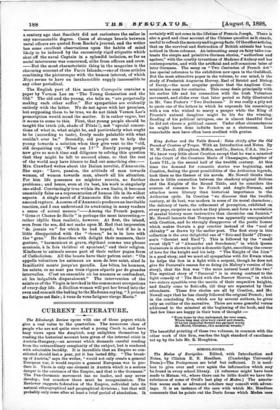CURRENT LITERATURE.
The Edinburgh Review opens with one of those papers which give a real value to the quarterlies. The numerous class of people who are not quite sure what a young Czech is, and have hazy views upon the Ausgleich, may enlighten themselves by reading the historical account here given of the internal crisis in Austria-Hungary,—an account which demands careful reading from the extraordinary complexity of the subject, but is rendered with admirable lucidity. It is incredible that an Empire so con- stituted should last a year, yet it has lasted fifty. "The break- up of Austria," says the writer, "would not only create a general European war, it would require a general European war to pro- duce it. There is only one element in Austria which is a serious danger to the existence of the Empire, and that is the Germans." The Pan-Germanic movement has no leader, and may never develop ; but somehow there must be reorganisation. The Reviewer suggests federation of the Empire, redivided into its natural ethnographical and geographical divisions ; but that will probably only come after at least a brief period of absolutism. It certainly will not come in the lifetime of Francis Joseph. There is- also a good and clear account of the Chinese question as it stands, useful to refresh the memory and to group facts. Of th e other articles, that on the survival and destruction of British animals has been noticed in these columns. An interesting essay on fairy tales con- trasts the simple and primitive German stories, " authorless and ageless," with the courtly inventions of Madame d'Aulnoy and her contemporaries, and with the artificial and self-conscious tales of later Germans. The essay on "Two Centuries of French Art" has special reference to the exhibition now open in the Guildhall_ But the most attractive paper in the volume, to our mind, is the study of Frederick Augustus Hervey, Earl of Bristol and Bishop of Derry,—the most singular prelate that the Anglican Com- munion has seen for centuries. This essay deals principally with. his earlier life and his connection with the Irish Volunteer movement, and slides over that later period so fully illustrated in Mr. Vera Fost,er's "Two Duchesses." It was really a pity not to quote one of the letters in which he expounds his reasonings, with a son who wished to marry a pauper while the King of Prussia's natural daughter might be his for the winning. Reading of his political intrigues, one is almost thankful that he did not choose a political career. Under other circumstances he might have done infinite harm as a statesman. Less remarkable men have often been eredited with genius.


































 Previous page
Previous page